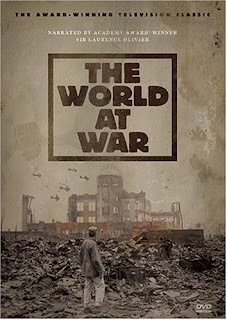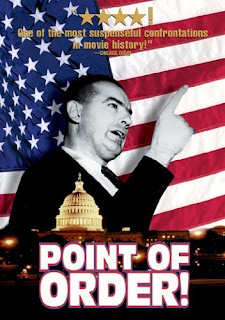I think the idea for this film is absolutely amazing. And I love how this documentary has become a series. It is such a great idea for them to follow up on the people every seven years. I've always wondered what it would be like to film someone when they are young and then old to see how different they are.
Wednesday, March 31, 2010
Seven Up
Seven Up! is a great documentary that follows around 20 kids that are all seven years old that were living in Britain at the time. The film was made in 1964. I believe this movie to be an observational documentary. The movie consists of interviews and following around the kids on their day to day life. Also, there are some staged shots.
I couldn't find a clip for Seven Up!, but I did find a clip for 49 UP. So here you go.
Sans Soleil
Sans Soleil was a documentary by filmmaker Chris Marker. The film basically shows shots that a traveler saw when he was over seas. A woman narrates the film.
This was one of the weirdest films I have ever seen. It's hard for me to even call it a documentary because it's so abstract. But Bill Nichols would consider this movie to be a Poetic Documentary.
In the movie there is a woman narrating over the film, but what she's saying doesn't really relate to what is going on in the movie. There are some points in the film where I felt like I could connect what was going on in the film with the narration, but it wasn't very often. I think the film is visually beautiful and I think the narration is very beautiful too. It's a beautiful piece of art.
Below is a clip from the film to get an idea of what it is like.
The Battle of San Pietro
The Battle of San Pietro was a documentary produced by The Army Pictorial Service and directed by John Huston. It was about the efforts to take Italy. There are two different versions of the documentary. One was approved by the U.S. Government and the other one wasn't. In class we watched the one that was approved by the government, so that is the one I will be writing about in this blog entry.
The crazy thing about The Battle of San Pietro is that it was all real. There are no reenactments, it is all 100% real. There are some really amazing shots that made me think, "how did they do that." They got these amazing shots because the camera men were really in the trenches with the soldiers. In fact, some camera men were killed during the making of this movie. When the director finished filming the movie he realized how terribly violent the war was. He decided to show what war was really like.
It was really hard for me to figure out what exactly the director was trying to do with this film when I first saw it. On the surface it was war propaganda made by the government. But underneath the surface there were little hints that the director was trying to tell us that war is terrible. One thing that stuck out for me was when the soldiers went out to make sure the civilians in Italy were alright. The narrator says something about the kids will forget about this in days and it shows shots of the demolished city and dead parents. Obviously the kids were not going to forget about this. Obviously they were not going to be o.k.
I think this movie was very clever in giving the government what they want while still expressing the ideas of the director, John Huston
Atomic Cafe
The Atomic Cafe is a super interesting film about atomic bombs and the United States. It was directed by Jayne Loader and Kevin Rafferty and was released in 1982. All the footage is archival footage. There is no "Voice of God" narrator. The whole story is told through archival footage and the way it is edited. There is one highly suggestive element to the movie and that is the music. There is a score to the movie and I don't know if it is original or not, but it manipulates my thinking.
The film shows all kinds of old videos about what to do if a nuclear bomb is detonated near you. Videos such as Burt the Turtle who promoted the "duck and cover" method. The documentary also shows lots and lots of detonations of nuclear weapons, all which were stunning. All this footage gives a clear picture of what it was like to live in the 1950's with the nuclear bomb scare.
I really liked this documentary. I found it very interesting. I couldn't believe that the U.S. evacuated a tribe from an island so they could ignite a nuclear weapon for an experiment. It seems to me that now days that would be considered unethical. I also couldn't believe that the U.S. let soldiers watch a detonation of an atomic weapon from a "safe distance," then they all started walking towards it.
If you are interested, here is the complete movie, The Atomic Cafe.
Cold War/World At War

The World at War is a documentary completely about WWII. It was actually a television series. I think there are 26 episodes all together. It's an expository documentary. The Cold War documentary is another expository documentary made by the March of Time.
The World at War is narrated by Laurence Olivier, the famous Shakespearian actor from England. I think his voice gives a sense of quality and weight to the film that it wouldn't have if there was no narration or if someone else narrated it. His voice sounds very authoritative. It sounds like whatever he says is a fact. I think that is a big part of what makes this documentary so great. The documentary has great information and great images too.
The Cold War is set up way more like a news cast because it was made by the March of Time. The March of Time was a newsreel that would play before movies. The narration is not as authoritative as Laurence Oliver's. It's more like a somewhat excited loud voice. The music also gives it more energy then The World At War documentary. The Cold War documentary was short, around 20-30 minutes.
Millhouse: A White Comedy

Millhouse: A White Comedy was most definitely my favorite film we watched in the documentary class. I think Richard Nixon is one of the most interesting characters in U.S. history. This is another film by Emile de Antonio. What's most interesting to me about this film is the fact that this documentary was made when people still liked Nixon. This film was made in 1971 before people knew about the scandals that Richard Nixon was involved with.
The documentary shows lots of archival footage. A lot of interviews were used in the making of this film, but I believe that all the interviews were already captured on film before de Antonio started working on this film. In my opinion, the documentary was supposed to challenge the image of Richard Nixon. I think that de Antonio was trying to expose Nixon for what he thought he really was. Which was a liar, a thief and a cheat.
The moment in the documentary that I found most striking was when Nixon was giving a speech to the republicans at a huge event filled with all middle aged and older white people. He was getting everyone fired up and he seemed like a good guy. Then cut to outside and around that same moment there was a civil rights riot in the street. Four African Americans died that night. That part in the documentary kind of opened my eyes to what kind of political animal Richard Nixon was. He was promoting himself to the people that would get him the votes he needed to become president.
This was a great documentary covering Richard Nixon. As I said earlier, it was my favorite documentary we watched in class. Watching Richard Nixon do his thing before he was president was fascinating.
POINT OF ORDER
 Point of order is a documentary by famous documentary filmmaker Emile de Antonio. The documentary is made up of all archival footage that was filmed with kinescopes when the show aired on television. The documentary does not have any narration. It's made up of very carefully picked shots and edited together in a way that made the 97 minute movie seem like it all took place in one day, but really the footage was captured over the course of a few months.
Point of order is a documentary by famous documentary filmmaker Emile de Antonio. The documentary is made up of all archival footage that was filmed with kinescopes when the show aired on television. The documentary does not have any narration. It's made up of very carefully picked shots and edited together in a way that made the 97 minute movie seem like it all took place in one day, but really the footage was captured over the course of a few months. The point of the documentary was to show how McCarthy manipulated people and accused people to get what he wanted and to defend himself. The movie does not need a narrator because the audience can see the destruction of McCarthy on footage and it is obvious. I also think that not having a narrator makes it more honest in a way. Yes, the director manipulated the film through editing, but the absence of the "Voice of God" narrator made it really seem like the director was not trying to shove anything down our throats.
When I started watching this movie, I really had no idea what it was about. I knew who McCarthy was, but I had never seen any of the Army-McCarthy footage before. And by the end of the movie I Couldn't stand McCarthy or Cohn. They were snakes. I was really hoping that they would get what they deserve. de Antonio's style of filmmaking was very effective on me and I really do think he was a talented filmmaker.
Subscribe to:
Comments (Atom)